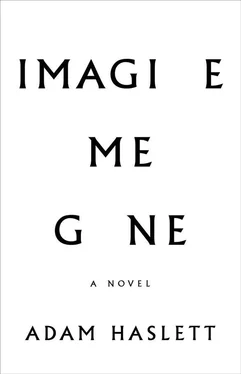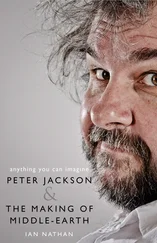He stood by the window now, gazing into the alley as if across a rough, romantic sea. “What does your boyfriend do in London? Is he an international businessman? Does he feature those fierce three-piece tweed suits? Or cravats, does he wear cravats?”
I couldn’t decide which of my brothers he’d get on with better, Michael or Alec.
“That wasn’t my boyfriend,” I said.
“Your lover, then.”
“Jasper, if you don’t apply to anything, I’ve got to put that in your file, and in a few weeks they’re going to tell me to terminate you from services.”
“If you lived in England, how come you don’t have an accent?”
“Listen—”
“Okay, I’ll apply. Just tell me.”
“I’ve lived here more.”
“Did you grow up in a house with servants?”
“Where do you get all this?”
He picked up and examined the tape dispenser on my desk as though admiring the facets of a crystal vase. I would have said he was high, but his speech and movements were too precise, his affect too consistent. He was practicing, that’s what he was doing, rehearsing for a future life.
“My grandmother said it was the classiest place she’d ever been, and that I would love it there. She had a videotape of Diana’s wedding. We used to watch it all the time. People thought she was pretentious, being into all that, so I knew she was onto something, pissing those jackasses off. She left me all that stuff, the books and music and the mugs with the coats of arms, everything she’d bought over there and all the stuff she’d collected. Most of it’s at my mom’s. But I brought a few things with me.”
I pictured him there with his grandmother, on their little island of manners. I wanted to draw him out on it, to hear what it meant to him. And from there maybe get him to talk about his growing up, and eventually about what exactly his stepfather had done that caused him to leave. Jasper was one of the clients who shared something of himself, if only because he desired an audience. Most of the kids I saw were sullen and defensive, and treated me as another scold of the adult world who didn’t care what they felt. It wasn’t that I wanted to cut him off now, just that our half hour was up. I told him he had to call me with the three jobs off the list he was going to pursue so I could set up the interviews, and that I needed copies of his applications at our next appointment.
“It’s true, isn’t it?” he said. “People do live in castles there.”
“Like ten people, Jasper. Most of them are just normal. They’re not that different than here. Really.”
“Normal like you? Like college and going to Europe and working here because you feel good helping ignorant people like me? That kind of normal?”
“Our time’s up,” I said. “I have someone waiting.”
“People always get angry when I tell the truth. Happens every time.”
On the outbound N Judah that evening I noticed a man in a three-piece suit. Instead of reading the paper folded in his hands, his eyes crept along the bodies of various young women, particularly those in skirts and lipstick, his glance occasionally falling on me as well, curious but uncertain, and a bit aggressive, a bit pissed off, as if I wasn’t giving him something that belonged to him.
Jasper’s image had stuck with me. Of my boyfriend dressed in tweed, like the suits Dad used to wear. Paul sitting at a big conference table with other men in suits and calling me after his meeting, as I suppose Dad had called Mom. I’d never wanted such a partner, or even been able to imagine why anyone would. Still, getting back to our apartment and finding Paul lying on the couch, reading under a blanket, a glass of bourbon beside him on the floor, I found myself wondering what it might be like if Jasper’s fantasy were even a little true.
The drink irked me. It threw his sugar off. Which made it more likely that he would have a low in the night, waking us both. But if it was just one, or maybe two, and he drank them slowly enough and timed his shots right, it might still be fine.
“What’s up?” he said. “How was the day?”
The fact that he was flat on the couch suggested his hadn’t been exactly fruitful. But then through the open French doors into the kitchen I noticed the sink was empty of dishes, and the cereal we’d needed was on the counter. So he’d been shopping. Which meant that he would make dinner, holding up his end of the bargain we’d struck: if he was going to work only part-time while he wrote his screenplay, he had to do more than his normal quarter share of the domestic work.
“The usual,” I said. “I badgered homeless kids to present themselves in a professional light.”
He chuckled, and took another sip of his drink. “Well, I finished my second act,” he said.
I was headed into the bedroom to change, but stopped in the doorway. “Really?” He grinned with an openness and satisfaction I hadn’t seen in him in a long while.
“That’s great,” I said. “Congratulations.”
“It’s just a draft. But thanks.”
He followed me into the bedroom and watched me start taking off my work clothes. He’d made the bed as well, and put away the laundry. For once, there was nothing to be disappointed in. Which left me with just the feeling of the disappointment itself. I tried to let go of it as I looked for my shorts and sneakers, to shuffle the weight of it off, the semiconstant low-grade suspicion that he was inadequate. That he didn’t have enough energy. That I had to provide it for both of us. That I would resent this no matter what else he did, or how well he managed his insulin.
He was standing by the door, smiling, as if his good cheer were nothing unusual. He hadn’t gotten his hair cut in a while and it hung down over his forehead, his dark curls set off by his pale, nearly unblemished skin. His boyishness had always been part of his allure. He was thirty-one, two years older than I was, but could pass for twenty-five. The most handsome man I’d been with. And the most ardent. At the beginning. Which had made a difference — his confidence. I want you . He’d been able to say that, clearly and aloud, before he knew what my response would be. Standing on the back porch of a triple-decker in Somerville, in frigid air, while the party carried on inside behind fogged windows. He’d put his red plastic cup down before saying it, his arms at his sides, unguarded, looking right at me. I’d had no time to think. When he leaned forward, I took the kiss, and gave it back. I wasn’t interested in being seduced. I was too wary for such credulity. But Paul had seduced me.
That was three years ago, back east, when I was still getting my master’s, and he was working at the Brattle, spending his mornings on his short film. We’d come out here to San Francisco as much to leave the place we’d both grown up as anything else. We’d found an affordable apartment far from downtown, and jobs that covered our rent, groceries, and student loans. For the first couple of years this had seemed like its own achievement, requiring nothing more. Paul’s college friends Laura and Kyle came for long weekends from Boulder, and we visited them in the summer, exploring parts of the country we had never seen. For our second Thanksgiving, I persuaded my mother, Michael, and Alec to fly across the country and I produced the full meal from our galley kitchen, after which the place seemed more like a home.
When Paul drank more than a diabetic should or we argued about petty domestic things, I would employ a kind of preemptive nostalgia, filing the episodes away under the heading A Couple’s Early Years. This generous retrospective of the present leaped ahead to forgive our moments of anger and doubt, and the occasional day when the frustration and recriminations between us became grinding. It helped alleviate my sense of having been duped into believing Paul would be the person to deliver me from my family, rather than imitate it. And really it was okay, and most often better than that, being the object of his desire, sensing he would never leave me. That we were safe.
Читать дальше












